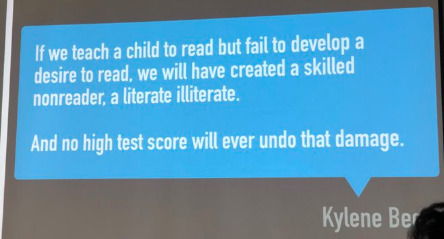Reading can be a very fraught topic for parents, teachers and students. Strong reading skills are essential for accessing later curriculum, so teachers put a lot of emphasis on it early. But the pressure and angst of getting students reading on schedule can sap the joy out of an activity that many young children love. At its heart, reading is a way to access stories, which in turn make readers wonder about the world. In the race to get kids reading, it can be easy to treat reading like a procedure, instead of the complicated experience that it is.
In her ten years of teaching, Courtney Rejent has had many students pass through her classes who claimed they hated reading, but rather than forcing them to read books they hate or making them fill out reading logs to show they read at home, Rejent has taken to heart an approach to reading that is much more relationship-based. Her sixth grade classroom runs on a reader's and writer's workshop model, which means students are doing the majority of their reading and writing in class, where Rejent can help them.
Research and publish the best content.
Get Started for FREE
Sign up with Facebook Sign up with X
I don't have a Facebook or a X account
Already have an account: Login
Professional learning in a glance (or two)!
Curated by
John Evans
 Your new post is loading... Your new post is loading...
 Your new post is loading... Your new post is loading...
|
|











